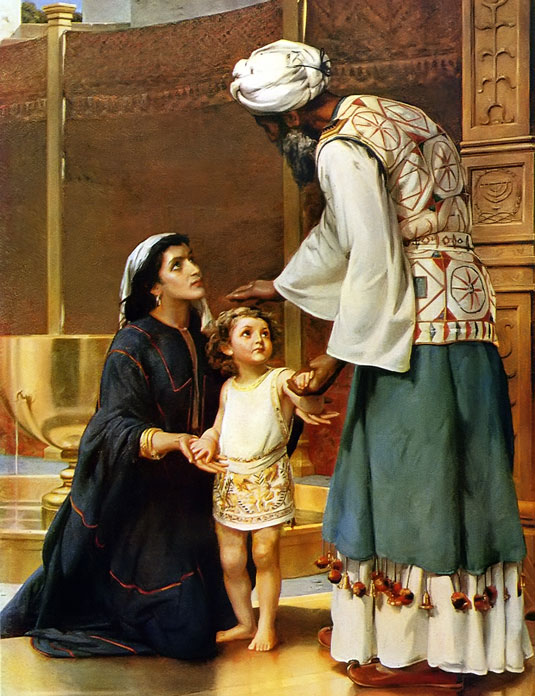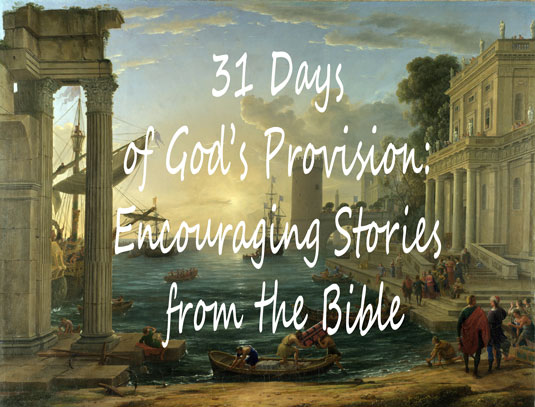 The story of Hannah is found in the Old Testament book of 1 Samuel. During this period, Israel was in a time of transition. Previously, God had communicated to his people by way of the high priest, but now he would begin to speak through a series of prophets. Leadership of the nation was moving away from the Judges as the people began to clamor for a king to rule over them instead. Unbeknownst to her, Hannah would become an instrumental part of God’s plan to fulfill the people’s request. As our story opens, Hannah and her husband are headed to the tabernacle in Shiloh, where they travel annually to worship and sacrifice to the Lord.
The story of Hannah is found in the Old Testament book of 1 Samuel. During this period, Israel was in a time of transition. Previously, God had communicated to his people by way of the high priest, but now he would begin to speak through a series of prophets. Leadership of the nation was moving away from the Judges as the people began to clamor for a king to rule over them instead. Unbeknownst to her, Hannah would become an instrumental part of God’s plan to fulfill the people’s request. As our story opens, Hannah and her husband are headed to the tabernacle in Shiloh, where they travel annually to worship and sacrifice to the Lord.
Unfortunately, they do not travel alone, as Hannah’s husband Elkanah has a second wife. Her name is Peninnah and she is quite fertile, having given Elkanah many children. This is not a good situation for Hannah. Having to compete with a second wife is bad enough, but to add injury to insult, Hannah has provided no children for her husband—a fact that Peninnah never lets her forget. Elkanah loves Hannah, and he tries to be supportive, but in a culture where a woman’s worth is based upon her ability to bear children, his love just can’t alleviate her pain.
Whenever the day came for Elkanah to sacrifice, he would give portions of the meat to his wife Peninnah and to all her sons and daughters. But to Hannah he gave a double portion because he loved her, and the Lord had closed her womb. Because the Lord had closed Hannah’s womb, her rival kept provoking her in order to irritate her. This went on year after year. Whenever Hannah went up to the house of the Lord, her rival provoked her till she wept and would not eat. Her husband Elkanah would say to her, “Hannah, why are you weeping? Why don’t you eat? Why are you downhearted? Don’t I mean more to you than ten sons?” 1 Samuel 1:4-8, NIV
This trip is no different than all the years before, as Peninnah has zealously demonstrated her passion for inflicting emotional pain on others. Her ridicule has been Hannah’s constant companion on this journey, bringing her to tears on more than one occasion. With deep despair, Hannah ponders her situation. “Oh, why can she not bear children?” Distraught, Hannah stands in the tabernacle and cries out to the only One who can change her status.
In her deep anguish Hannah prayed to the Lord, weeping bitterly. And she made a vow, saying, “Lord Almighty, if you will only look on your servant’s misery and remember me, and not forget your servant but give her a son, then I will give him to the Lord for all the days of his life, and no razor will ever be used on his head.” 1 Samuel 1:10-11, NIV
Eli the priest is sitting by the door, and watching Hannah as she silently prays. When he sees her mouth move but can hear no words, he assumes she has been drinking, so he walks right over to Hannah to confront her. She confesses her pain to the priest.
“Not so, my lord,” Hannah replied, “I am a woman who is deeply troubled. I have not been drinking wine or beer; I was pouring out my soul to the Lord. Do not take your servant for a wicked woman; I have been praying here out of my great anguish and grief.” 1 Samuel 1:15-16, NIV
Understanding his mistake and recognizing her anxiety for a child, Eli blesses Hannah and sends her on her way.
Eli answered, “Go in peace, and may the God of Israel grant you what you have asked of him.” 1 Samuel 1:17, NIV
With a bright hope for the future, Hannah returns home. In time, the Lord grants her request and she bears a son. She names him Samuel, which means heard of God. After a few years, Hannah takes little Samuel back to the tabernacle in Shiloh, and dedicates him to the service of the Lord as she had promised she would do.
When the bull had been sacrificed, they brought the boy to Eli, and she said to him, “Pardon me, my lord. As surely as you live, I am the woman who stood here beside you praying to the Lord. I prayed for this child, and the Lord has granted me what I asked of him. So now I give him to the Lord. For his whole life he will be given over to the Lord.” And he worshiped the Lord there. 1 Samuel 1:25-28, NIV
God blesses Samuel as he grows up, and eventually Samuel becomes a recognized prophet of God. Later in his life, Samuel is tasked with anointing the first two kings of Israel—first Saul and then a shepherd boy by the name of David, whose genealogy would later include the promised Messiah. As the Israelites cry out to God to give them a king, Hannah cries out to the Lord to give her a child. God answers both prayers, but not just to provide one king or one child, but to provide a savior for all people. A barren woman just wanted a baby, but was blessed by God in ways that she could never have imagined.
Hannah’s story was one of deep despair, but God’s provision was one of answered prayer.
Join me tomorrow for a story involving a vivid dream, a golden statue, and a provision of preservation!
 If you’ve missed any part of this series, you can find all of the posts in the side bar category 31 Days of God’s Provision.
If you’ve missed any part of this series, you can find all of the posts in the side bar category 31 Days of God’s Provision.
On the journey toward Home,












{ 1 trackback }